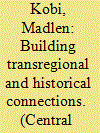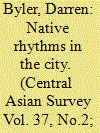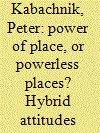|
|
|
Sort Order |
|
|
|
Items / Page
|
|
|
|
|
|
|
| Srl | Item |
| 1 |
ID:
159256


|
|
|
|
|
| Summary/Abstract |
Economic investment and the growing immigration of Han Chinese from other parts of China to the Xinjiang Uyghur Autonomous Region over the last three decades have increased the presence of eastern Chinese architecture in the urban built environment. This paper refers to the making of, residing in and speaking about the materiality of urban architecture by Turkic-speaking Muslim Uyghur middle-class actors. Besides creating personal comfort through Uyghur elements they draw ethnic boundaries to the Han Chinese. In highlighting the materiality of architecture, the analysis expands beyond the individual house by investigating the ways in which urban architecture offers spaces of meaning for social and ethnic communities. Based on ethnographic data, this paper argues that due to the political context and the state-controlled urban development with Chinese characteristics, urban Uyghur architecture was relegated from the outside of houses to an emphasis on interior decoration.
|
|
|
|
|
|
|
|
|
|
|
|
|
|
|
|
| 2 |
ID:
159257


|
|
|
|
|
| Summary/Abstract |
This article examines the complexities of women’s increasing participation in international development programming for gender equality. Taking a specific setting in rural Kyrgyzstan where one such project has been operating, the researchers discover adverse effects on the local women’s livelihoods, status and health. Women’s contradictions are attributed to the women’s own failures and lacks, creating confusion and frustration among them. Adopting Smith’s institutional-ethnography approach, we explicate and map out the hidden processes which must be held accountable for these reactionary outcomes, taking women’s experiences as entry points to inquiry. We find that the reactionary effects are not accidental but organized, powerfully, systematically but invisibly, by taken-for-granted institutional practices serving the purposes of global development institutions, where women are seen as instruments of global economic growth. The analysis provokes critical discussion of ‘how’ and ‘what’ it takes to transform Central Asian women into ‘empowered’ people.
|
|
|
|
|
|
|
|
|
|
|
|
|
|
|
|
| 3 |
ID:
159258


|
|
|
|
|
| Summary/Abstract |
This article explores the politics of older women in post-Soviet Kyrgyzstan, who have emerged as informal leaders in urban neighbourhoods to ‘speak for the poor’ to the state. Their mediating role is crucial for understanding community micro-politics, women’s political agency and more broadly state–society relations in the post-Soviet context. Drawing on in-depth interviews with older female informal leaders, the paper examines their political legitimacy and modes of mediation with the state and elites. Using Bourdieu’s concepts of political capital and ‘double dealings’, the paper argues that older women are important informal mediators, whose representational practices involve communal leadership, protest activism, bargaining and vote mobilization. Their multitasking roles are necessitated by their legitimation struggles and elites’ strategies of state capture. The article challenges the dominant media representation of older women activists as ‘a mob for hire’ and offers a more nuanced account of older women’s politics, addressing a blind spot in the literature on politics in Central Asia.
|
|
|
|
|
|
|
|
|
|
|
|
|
|
|
|
| 4 |
ID:
159255


|
|
|
|
|
| Summary/Abstract |
Over the past two decades, state-directed Han settlement and capitalist development in the Uyghur homeland in Chinese Central Asia have uprooted thousands of Uyghurs, causing them to move to the city. In this article, I explore how low-income male Uyghur migrants and Uyghur culture producers build a durable existence despite these challenges. Based on analysis of migrant responses to the Uyghur-language urban fiction and indigenous music as well as ethnographic observations of Uyghur migrants from Southern Xinjiang, I argue that indigenous knowledge provides underemployed male Uyghurs a means to refuse the alienating effects of settler colonialism and economic development. By broadening the scope of what counts as ‘resistance’ to Chinese attempts to eliminate aspects of Uyghur society, I show that ‘refusal’ can be a generative way of embodying sovereignty, particularly when confronted by structural violence.
|
|
|
|
|
|
|
|
|
|
|
|
|
|
|
|
| 5 |
ID:
159259


|
|
|
|
|
| Summary/Abstract |
This article explores the hybridity of commemoration by analysing people’s attitudes to three types of contested Soviet symbols in post-Soviet Georgia. I draw on 62 in-depth qualitative interviews conducted in 2012–2013 with Georgians in Tbilisi, Georgia. These interviews focused on what people thought about places of memory, Soviet symbols in public space, and memory politics and policies in contemporary Georgia. I examine their opinions of three different types of reminders of the Soviet past in public space: general Soviet symbols; street names; and the Stalin monument in Gori. This analysis reveals their diverse understandings of place and highlights the hybridity of their responses to the different elements of Soviet symbolism. This not only prevents one from creating ideal typologies when considering places of memory, but also highlights the impact of the form and location of the symbol. I also identify two ways that people conceptualize place, one that recognizes the power of place, and the other that perceives place as powerless.
|
|
|
|
|
|
|
|
|
|
|
|
|
|
|
|
| 6 |
ID:
159261


|
|
|
|
|
| Summary/Abstract |
As Kazakhstan aims to become one of the top 30 developed countries by 2050, it is increasingly turning to ways which will improve its governance, one of which is greater participation by its citizens in the decision-making processes of state agencies. A new initiative aimed at doing just that, the establishment of public councils, received legal backing in January 2016. The aim of public councils is to ‘strengthen democracy and the quality and responsiveness of public polices’ through the ‘public expression of matters of concern to Kazakh citizens’. This article offers a formative evaluation of the role performed by public councils and questions the extent to which they have achieved this aim. It draws on primary data from public officials, non-governmental organizations, ministries, and non-participant observation of public councils in Kazakhstan. It finds limited evidence of their effectiveness to date.
|
|
|
|
|
|
|
|
|
|
|
|
|
|
|
|
| 7 |
ID:
159260


|
|
|
|
|
| Summary/Abstract |
This article examines how reputational concerns drove the adoption of the Extractive Industries Transparency Initiative (EITI) in Kazakhstan. The article argues that Kazakhstan's decision to join EITI was largely driven by the government’s intention to use EITI as a rational governance tool to manipulate its political agenda to protect the regime’s legitimacy. However, norm adherence does not reflect effective compliance. The findings of EITI in Kazakhstan show that the adoption of EITI standardized requirements followed a specific internal logic that disconnects from the initiative’s initial purpose. The case of Kazakhstan further illustrates the limitations of external remedies to the ‘resource curse’ and emphasises the significance of vertical accountability in political regimes. The article urges scholars and policy advisers to further investigate how global governance arrangements are implemented at domestic levels, particularly in autocratic regimes.
|
|
|
|
|
|
|
|
|
|
|
|
|
|
|
|
|
|
|
|
|